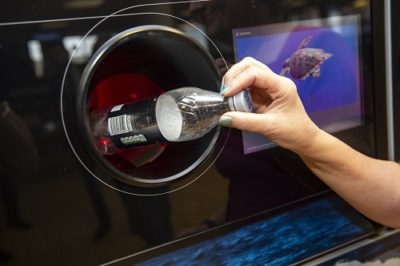The British Retail Consortium has called for any Scottish deposit return system to be “consistent” with the rest of the UK.
The comments came from the trade association’s director of food and sustainability, Andrew Opie, on the closing of the Scottish government’s public consultation yesterday.

The British Retail Consortium has called for the Scottish deposit return system to be consistent with the rest of the UK
Under a deposit return scheme (DRS), customers pay a small deposit when they buy drinks in, for example, a bottle or a can and get the deposit back when they return the empty container for recycling.
Consultation
The Scottish Government launched its consultation at the end of June (see letsrecycle.com story), which looked at factors such as the types of materials to form part of the DRS, the cost of the deposit and where materials can be returned to.
In a statement, Mr Opie said: “Creating a Deposit Return System is an incredibly ambitious, but immensely complex and costly proposal and the system that is developed in Scotland will need to be consistent with the rest of the UK.
“Retailers want a smart DRS system that enables meaningful progress – one that is targeted in a way so that it complements rather than cannibalises local authority kerbside recycling collections, which is a source of revenue for councils.”
The Scottish Government confirmed its plans to implement a DRS for drinks containers across Scotland last year. The announcement was followed by calls for more consultation from Scottish businesses (see letsrecycle.com story).
Concerns have also been raised by local authorities in the past that deposit schemes could undermine councils’ kerbside collection systems already in place for materials.
“Our view is that a targeted, industry owned non-profit model will deliver the best results.”
Andrew Opie
British Retail Consortium
“Our view is that a targeted, industry owned non-profit model will deliver the best results,” Mr Opie said.
Costs
However, Mr Opie outlined the high costs involved in creating the infrastructure for a deposit system. “Establishing a DRS will be very expensive,” he explained. “Return vending machines alone could cost retailers over £1 billion, a cost which will ultimately have to be recouped from consumers. A less focused approach would be even more costly.”
According to Zero Waste Scotland, its research shows over 64,000 tonnes of plastic food packaging and plastic bottles is thrown away into household general rubbish bins and sent to landfill every year in Scotland, costing the country £11million each year.
Meanwhile, evidence shows countries with deposit return schemes operating overseas can reach over 90% recycling for targeted drinks containers, Zero Waste Scotland says.
UK
The UK government also confirmed is plans earlier this year to introduce some form of DRS for single use drinks containers, which could cover plastic and glass bottles, as well as cans (see letsrecycle.com story).
The post Scottish DRS should be ‘consistent’ with UK appeared first on letsrecycle.com.
Source: letsrecycle.com Plastic



